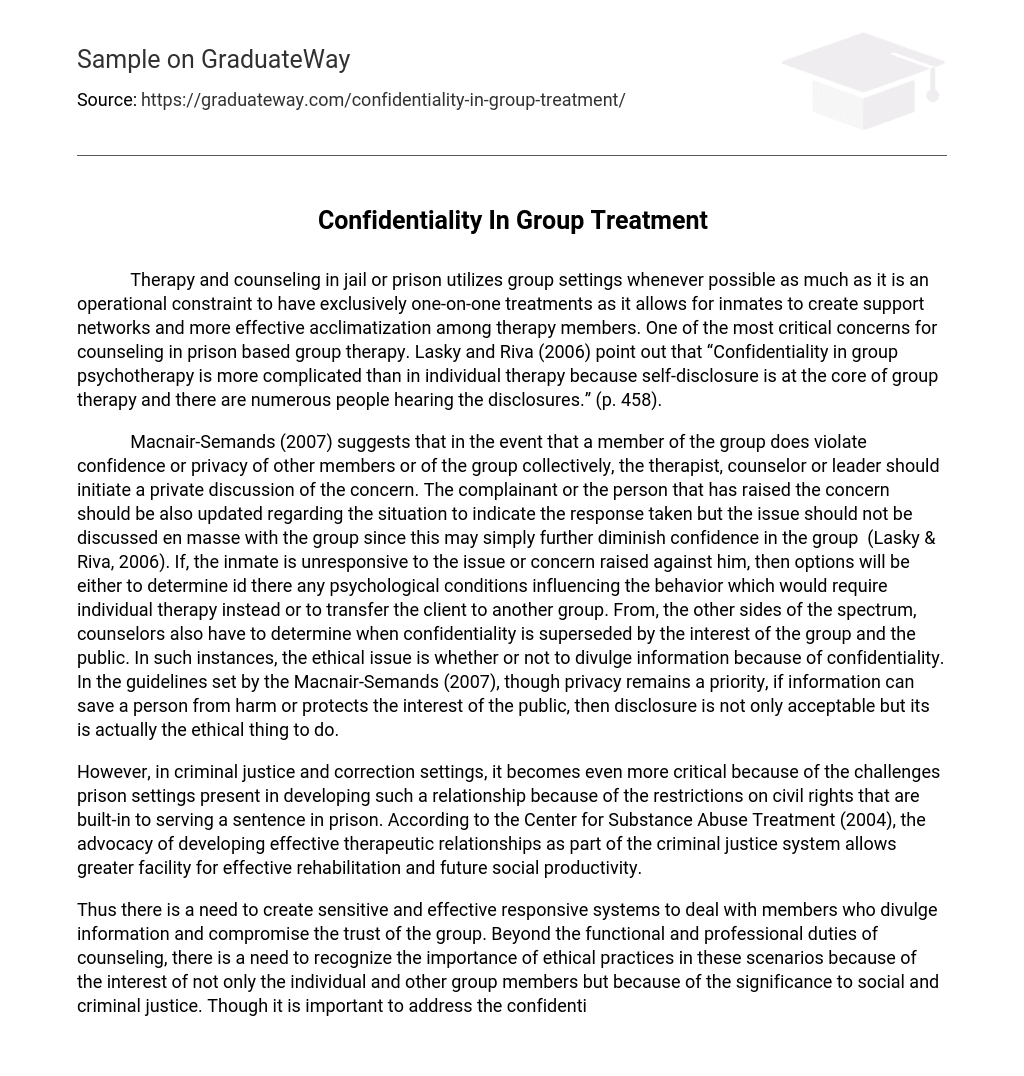Therapy and counseling in jail or prison utilizes group settings whenever possible as much as it is an operational constraint to have exclusively one-on-one treatments as it allows for inmates to create support networks and more effective acclimatization among therapy members. One of the most critical concerns for counseling in prison based group therapy. Lasky and Riva (2006) point out that “Confidentiality in group psychotherapy is more complicated than in individual therapy because self-disclosure is at the core of group therapy and there are numerous people hearing the disclosures.” (p. 458).
Macnair-Semands (2007) suggests that in the event that a member of the group does violate confidence or privacy of other members or of the group collectively, the therapist, counselor or leader should initiate a private discussion of the concern. The complainant or the person that has raised the concern should be also updated regarding the situation to indicate the response taken but the issue should not be discussed en masse with the group since this may simply further diminish confidence in the group (Lasky & Riva, 2006). If, the inmate is unresponsive to the issue or concern raised against him, then options will be either to determine id there any psychological conditions influencing the behavior which would require individual therapy instead or to transfer the client to another group. From, the other sides of the spectrum, counselors also have to determine when confidentiality is superseded by the interest of the group and the public. In such instances, the ethical issue is whether or not to divulge information because of confidentiality. In the guidelines set by the Macnair-Semands (2007), though privacy remains a priority, if information can save a person from harm or protects the interest of the public, then disclosure is not only acceptable but its is actually the ethical thing to do.
However, in criminal justice and correction settings, it becomes even more critical because of the challenges prison settings present in developing such a relationship because of the restrictions on civil rights that are built-in to serving a sentence in prison. According to the Center for Substance Abuse Treatment (2004), the advocacy of developing effective therapeutic relationships as part of the criminal justice system allows greater facility for effective rehabilitation and future social productivity.
Thus there is a need to create sensitive and effective responsive systems to deal with members who divulge information and compromise the trust of the group. Beyond the functional and professional duties of counseling, there is a need to recognize the importance of ethical practices in these scenarios because of the interest of not only the individual and other group members but because of the significance to social and criminal justice. Though it is important to address the confidentiality offender since his divulgence maybe indicative other psychiatric or behavioral concern, there is an ethical need to prioritize the interest of the group and the justice system.
References
Center for Substance Abuse Treatment (2004). Substance abuse treatment: group therapy. Rockville, MD: Substance Abuse and Mental Health Services Administration
Lasky, Gina B. and Riva, Maria T. (2006). Confidentiality and Privileged Communication in Group Psychotherapy. International Journal of Group Psychotherapy Volume 56 Issue 4. pp. 455-476
Macnair-Semands, Rebecca R.. (2007). Attending to the Spirit of Social Justice as an Ethical Approach in Group Therapy. International Journal of Group Psychotherapy,| Volume 57 Issue1. pp. 61-66





